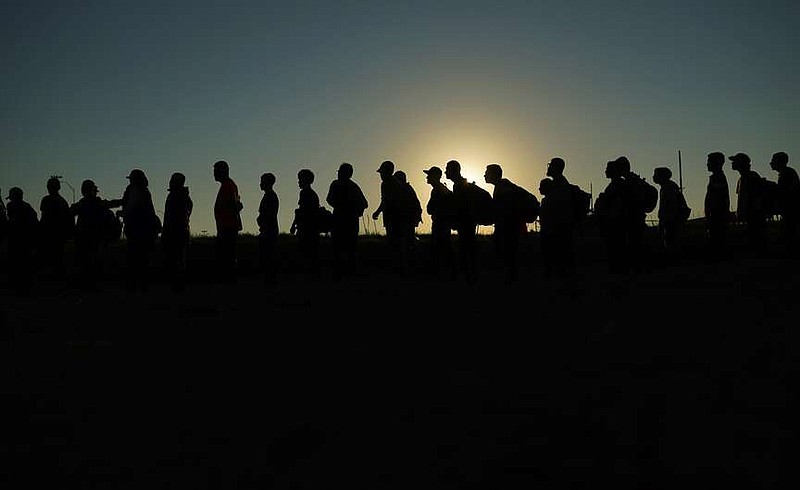AUSTIN, Texas -- A federal judge on Thursday blocked a new Texas law that would give police broad powers to arrest migrants suspected of illegally entering the U.S., dealing a victory to the Biden administration with a broad rejection of Republican Gov. Greg Abbott's immigration enforcement effort.
U.S. District Judge David Ezra's preliminary injunction pausing a law that was set to take effect Tuesday came as President Joe Biden and his likely Republican challenger in November, Donald Trump, were visiting Texas' southern border to discuss immigration.
The state attorney general's office immediately appealed the ruling, according to a statement Thursday.
The ruling rebuked Texas' immigration enforcement effort on multiple fronts, brushing off claims by Republicans about an ongoing "invasion" along the southern border due to record-high illegal crossings. In granting a preliminary injunction on Thursday, Ezra, who was appointed to the bench by President Ronald Reagan, said the federal government was likely to eventually win the case on the merits.
"No matter how emphatic Texas's criticism of the federal government's handling of immigration on the border may be to some," Ezra wrote in his 114-page decision, "disagreement with the federal government's immigration policy does not justify a violation of the Supremacy Clause" of the Constitution.
He said that, among the many legal problems presented by the Texas law, it would "moot many asylum applications" and "seriously harm" relations with Mexico. He said the provision of the law allowing state judges to order the removal of noncitizens is "patently unconstitutional" and could hamper U.S. foreign relations and treaty obligations
It is the second time in six months that Ezra has stopped one of Abbott's border escalations, having also ruled against a floating barrier Texas erected in the Rio Grande.
Allowing Texas to "permanently supersede federal directives" due to a so-called invasion would "amount to nullification of federal law and authority -- a notion that is antithetical to the Constitution and has been unequivocally rejected by federal courts since the Civil War," the judge wrote.
Opponents have called the Texas measure the most dramatic attempt by a state to police immigration since a 2010 Arizona law that opponents derided as the "show me your papers" bill. The U.S. Supreme Court partially struck down the Arizona law, but some Texas Republicans want that ruling to get a second look.
In his decision, Ezra wrote that the Texas law was preempted by the decision in the Arizona case, adding that the two laws had "striking similarities." He also struck down state officials' claims that large numbers of illegal border crossings constitute an "invasion," saying calling it such is a novel interpretation of the Constitution's invasion clause and that allowing the law to stand would be permitting the state to engage in war.
Although some may empathize with Texas officials' claims regarding the federal government's handling of immigration policy, it is not an excuse to violate the Constitution, the judge wrote.
In a statement, Abbott blamed the influx of migrants on Biden and said "we will not back down in our fight to protect our state -- and our nation."
"Texas has the right to defend itself because of President Biden's ongoing failure to fulfill his duty to protect our state from the invasion at our southern border," he wrote, noting that he believes the case will ultimately end up before the Supreme Court.
The 5th U.S. Circuit Court of Appeals could step in and issue a stay, suspending Ezra's injunction and allowing the law to go into effect while it considers the appeal by Texas. During the hearing last month, lawyers for Texas, anticipating a possible decision against them, argued for the lower court to stay its decision pending an appeal. Ezra denied that request.
Civil rights groups who sued the state have argued that if allowed to stand, the law -- Senate Bill 4 -- could lead to civil rights violations and racial profiling. They released a joint statement celebrating the decision.
"With today's decision, the court sent a clear message to Texas: SB4 is unconstitutional and criminalizing Black, Brown, Indigenous, and immigrant communities will not be tolerated," said Jennifer Babaie, director of advocacy and legal services with Las Americas Immigrant Advocacy Center.
The Biden administration's lawsuit over the law is one several legal battles between it and Texas over how far the state can go to try to prevent migrants from crossing the border.
'WHAT A NIGHTMARE'
Under the rejected law, state law enforcement officers could arrest people suspected of entering the country illegally. Once in custody, they could agree to a Texas judge's order to leave the country or face a misdemeanor charge for entering the U.S. illegally. Migrants who don't leave after being ordered to do so could be arrested again and charged with a more serious felony.
Texas has been arresting migrants for years under a more limited program based on arrests for criminal trespassing.
It is already illegal under federal law to cross into the United States between legal ports of entry. But in practice, most migrants are not prosecuted the first time they do so. Most of those apprehended are not trying to evade authorities but rather are trying to be detained by the U.S. Border Patrol, affording them a chance to seek asylum protections. Although the majority of asylum claims are eventually denied, the cases can take years to be resolved, and migrants are permitted to remain in the country in the meantime.
The Texas Legislature designed SB4 to closely follow the federal law barring illegal entry, making it a state-level misdemeanor to enter Texas from Mexico. A second illegal entry, under the law, would be a felony.
Immigrant groups, civil rights advocates and some Texas Democrats have criticized the legislation because it would make it more difficult for migrants who have been persecuted in their home countries to seek asylum, and it does not protect legitimate asylum-seekers from prosecution in state courts.
Critics have also said that the law could lead to racial profiling, because it would permit law enforcement officers across Texas, even those far from the border, to arrest anyone they suspect of having entered illegally in the previous two years.
"It just slaps the federal immigration law in the face," Ezra said during a Feb. 15 hearing.
At the hearing, Ezra expressed skepticism as the state pleaded its case. In his ruling, he doubled down on the thought, adding that "SB4 threatens the fundamental notion that the United States must regulate immigration with one voice."
During the hearing on SB4, Ezra asked questions frequently, particularly when the lawyer representing the Texas attorney general was speaking, and had appeared to be strongly skeptical of the law.
"Let's say for the purpose of argument that I agree with you," he told the state's lawyer, Ryan Walters. California might then want to pass its own immigration and deportation law, he said. Maybe then Maine would follow, he said, and then others, like Louisiana or Arizona or New Mexico.
"That turns us from the United States of America into a confederation of states," Ezra said. "What a nightmare."
Lawyers for Texas, from the office of Republican Attorney General Ken Paxton, argued in their opposition to the injunction that the state law did not conflict with federal law because it "comports" with existing federal prohibitions on illegal entry.
The state's lawyers described the recent record number of migrant arrivals at the Texas border as "a full-scale invasion of transnational criminal cartels" and argued that Texas had the power to defend itself. They pointed to Article I, Section 10 of the U.S. Constitution, which bars states from engaging in war "unless actually invaded."
Under pressure from immigration hard-liners and former Trump administration officials, Abbott said in November 2022 that he had invoked the "invasion" clause. The state has also cited the constitutional provision in the other pending cases between Texas and the federal government.
Republicans who back the law have said it would not target immigrants already living in the U.S. because of the two-year statute of limitations on the illegal-entry charge and would be enforced only along the state's border with Mexico.
Other Republican governors have expressed support for Abbott, who has said the federal government is not doing enough to enforce immigration laws.
Among other things, Texas placed the floating barrier in the Rio Grande, put razor wire along the U.S.-Mexico border and stopped Border Patrol agents from accessing a riverfront park in Eagle Pass that they previously used to process migrants.
Information for this article was contributed by Acacia Coronado of The Associated Press and by J. David Goodman of The New York Times.

